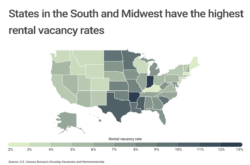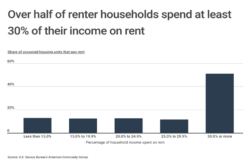Addressing High Apartment Vacancy Rates: Causes and Solutions
By Clifford Hockley, CPM, CCIM
The fluctuating demand for apartment and home rentals is closely tied to economic cycles. In the recent cycle of overbuilding, driven by low interest rates and government incentives, a surplus of housing units emerged, especially in regions experiencing slowed population growth. This oversupply has contributed to high vacancy rates in certain areas, such as the Charleston-North Charleston, SC region, which boasts a 15.3% rental vacancy rate as of October 2023. (1)
Several factors contribute to the challenge of renting apartments, and property owners and managers must identify and address these issues strategically. Here are some key reasons why apartments may remain unrented.
- Seasonality– The rental market often experiences slower activity from late October through February each year.
- High Rent Expectations- Setting rent too high can deter potential tenants, particularly in markets with abundant rental options. New construction costs, influenced by higher interest rates and increased labor and material expenses, can drive up overall rent costs.
- Affordability Gap- Newly constructed units may face challenges in renting due to an affordability gap, especially in markets where tenants are rent-burdened. According to the U.S. Department of Housing and Urban Development (HUD), a household is considered rent burdened if they spend more than 30% of their income on rent and utilities. Income growth may not keep pace with rising rental costs. (2)
- Poor Management- Neglected curb appeal and outdated interiors can result in higher vacancy rates. Landlords need to prioritize property maintenance, upgrade unit interiors, and ensure a positive tenant experience.
- Ineffective Staffing- Lack of proper staffing, including the inability to conduct contactless showings or virtual interactions, can reduce property demand and slow down the rental process.
To address high vacancy rates, property owners and managers can consider the following strategies:
Strategic Pricing and Tenant-Friendly Offerings
- Align rent with market rates.
- Offer competitive security deposits.
Accommodate Changing Tenant Preferences
Apartments must meet evolving tenant expectations by providing essential amenities. Failure to do so prompts tenants to seek residences that fulfill these criteria as demonstrated in a 2023 survey according to iApartments (3)
- Recognize the importance of pet-friendly policies, especially in one-bedroom units.
- Provide essential amenities, such as touchless self-guided tours, in-unit washer and dryer, and high-speed internet access.
Rental Incentives
- Carefully consider incentives based on market and tenant needs.
- Examples include resident referral programs, free months of rent, reduced security deposits, and subscriptions to amenities like a gym or grocery delivery.
While rental incentives can be effective, property owners should be cautious about potential long-term impacts on property values, especially with the rise of rent control measures in various locations. As of December 2023, about 180 local governments have passed some form of rent control. (4)
In conclusion, addressing high vacancy rates requires a thoughtful approach that considers the unique factors influencing each market. Property owners and managers must analyze the causes of their vacancy rates and implement tailored strategies to attract tenants. Testing different approaches may be necessary to find the most effective solutions.
References
(1) Jones, Jonathan. “American Cities with the Highest Rental Vacancy Rates in 2023.” Construction Coverage, Oct 26, 2023, https://constructioncoverage.com/research/cities-with-the-highest-rental-vacancy-rates-2023
(2) Aratani, Yumiko, et al. “Rent Burden, Housing Subsidies, and the Well-being of Children and Youth.” National Center for Children in Poverty, Nov 2011, https://www.nccp.org/publication/rent-burden-housing-subsidies-and-the-well-being-of-children-and-youth/
(3) iApartments. “Apartment Renter Preferences for 2023”. iApartment – Smart Apartments. Feb 6th, 2023, https://www.iapts.com/apartment-renter-preferences-2023/
(4) Lee, Medora. “Rent control laws on the national level? Biden administration offers a not-so-subtle push.” USA Today, Sept 5, 2023, https://www.usatoday.com/story/money/personalfinance/2023/09/05/federal-rent-control-laws-debate/70666376007/


